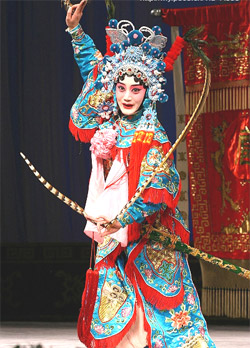

Xipi literally means 'Skin Puppet Show', referring to the puppet show that originated in Shaanxi province. The tune of Peking opera is extremely similar to that of Han opera, therefore Han opera is widely known as the Mother of Peking opera. Peking opera's two main melodies, Xipi and Erhuang, were derived from Han Opera after about 1750.

Peking opera is generally regarded as having fully formed by 1845.Although it is called Peking opera (Beijing theatre style), its origins are in the southern Anhui and eastern Hubei, which share the same dialect of Xiajiang Mandarin (Lower Yangtze Mandarin). The combination gradually formed Peking opera's melodies. In 1828, several famous Hubei troupes arrived in Beijing and performed jointly with Anhui troupes. It was originally staged for the court and only made available to the public later. History & Background Peking opera was born when the ' Four Great Anhui Troupes' brought Anhui opera, or what is now called Huiju, in 1790 to Beijing, for the eightieth birthday of the Qianlong Emperor on 25 September. It has also spread to other countries such as the United States and Japan. The art form is also preserved in Taiwan (Republic of China), where it is known as Guójù. Major performance troupes are based in Beijing and Tianjin in the north, and Shanghai in the south. The form was extremely popular in the Qing dynasty court and has come to be regarded as one of the cultural treasures of China. It arose in the late 18th century and became fully developed and recognized by the mid-19th century. Overview Peking opera or Beijing opera is a form of Chinese opera which combines music, vocal performance, mime, dance, and acrobatics.


 0 kommentar(er)
0 kommentar(er)
